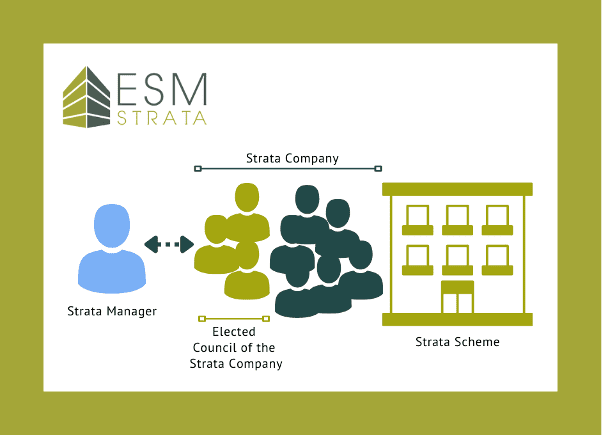Owning a strata title offers several benefits, including affordability, access to shared facilities, and the opportunity to share financial responsibility for maintenance work. However, for many people, when they first begin exploring strata living, the terms and concepts associated with it can seem somewhat confusing. We’re here to help you understand everything you need to know about strata living in Western Australia, particularly under the guidance of the Strata Titles Act 1985 (WA), which governs how strata schemes operate in this state.
What is a Strata Company and the Council of the Strata Company?
A Strata Company consists of the group of owners of a strata titled property. When you own a lot within a strata scheme, such as an apartment or townhouse, you automatically become a member of the Strata Company. This company is responsible for managing the common property and ensuring compliance with the by-laws that govern the strata scheme.
On the other hand, the Council of the Strata Company is a smaller, elected group of owners. This council is chosen by the broader Strata Company to represent the interests of all owners and to manage the day-to-day responsibilities of the scheme. Their duties include overseeing common property maintenance, addressing issues related to by-laws, and working closely with the appointed Strata Manager.
Responsibilities of the Council of the Strata Company
Being a part of the Council of the Strata Company comes with significant responsibilities. Council members must act in the best interests of the entire Strata Company, as outlined in the Strata Titles Act 1985 (WA). Each member must:
- Act honestly and with integrity
- Exercise due care, skill, and diligence in fulfilling their duties
- Avoid using their position for any improper advantage or personal gain
- Declare any conflict of interest that may impact their role on the council
The Strata Titles Act ensures that council members are held accountable, and failure to adhere to these principles can lead to disputes and potential legal consequences. It is essential that council members remain transparent and committed to the well-being of all strata property owners.
What Happens if There is No Council?
Some strata schemes don’t elect a council, meaning that all decisions regarding the property are made collectively by the Strata Company as a whole. Under this arrangement, every owner is responsible for participating in decision-making processes, as required by the Strata Titles Act.
For any action to take place, at least 50% of owners must approve decisions. This requirement can sometimes create delays, especially when it comes to urgent maintenance work or common property issues. Without a council to streamline decision-making, there is a risk of the property becoming less well-maintained or of key matters being delayed for extended periods.
The Strata Titles Act emphasises the importance of governance and encourages the election of a council to ensure the effective operation of the strata scheme. Having an elected council allows for more efficient management of the strata property and ensures that important issues are addressed in a timely manner.
Who is the chairperson?
A Chairperson is an elected member of the Body Corporate (or Council of the Strata Company) who plays a crucial role in facilitating meetings and ensuring that the council operates smoothly. They are responsible for presiding over meetings, ensuring discussions remain on track, and making sure decisions are made in accordance with the Strata Titles Act 1985 (WA) and the by-laws of the strata scheme.
The Chairperson’s role includes ensuring that all council members have the opportunity to contribute to discussions, that decisions are reached fairly, and that proper procedures are followed during meetings. While they hold an important leadership position, their vote carries the same weight as any other council member, and their role is to guide, not dictate, the actions of the Body Corporate.
The Role of the Strata Manager
Many strata schemes engage a Strata Manager to assist with the administrative and management tasks associated with running a strata company. The Strata Titles Act outlines that Strata Managers should act in accordance with the Strata Company’s instructions, manage finances, coordinate maintenance, and ensure compliance with by-laws.
The Strata Manager works closely with the Council of the Strata Company, ensuring that decisions made by the council are executed properly. In well-managed strata schemes, an active council that regularly liaises with the Strata Manager can ensure that the property is well-maintained, compliant with regulations, and that all owners are informed and involved in decision-making when necessary.
Strata Living and By-Laws
One of the key elements of strata living is understanding and adhering to the by-laws of your strata scheme. By-laws are the rules that govern the behavior of owners, residents, and visitors within the strata property. They may cover a wide range of issues, including noise control, parking, pet ownership, and the use of common property.
The Strata Titles Act requires that by-laws be fair and reasonable, ensuring that they do not unfairly discriminate against owners or residents. If there is a dispute about a by-law, owners can apply to the State Administrative Tribunal (SAT) for resolution. It is important for all owners to be familiar with their scheme’s by-laws and to ensure they are upheld.
Why is a harmonious Strata Company important?
Living in a well-managed strata property has many advantages. With an active Council of the Strata Company and a competent Strata Manager, you can rest assured that the property will be well-maintained, by-laws will be enforced, and finances will be managed transparently. This also helps ensure the property maintains or increases its value over time. The Strata Titles Act provides a framework to protect the rights of all owners and ensure that the strata property operates smoothly. However, it is up to the owners and the elected council to ensure the scheme is effectively managed. If you’re living in or considering purchasing a strata property, understanding these roles and responsibilities will help you navigate strata living with confidence.
For more information on strata management, feel free to contact us at ESM Strata. We’re here to assist you in understanding your rights and responsibilities under the Strata Titles Act and to ensure your strata property is well-managed for years to come.
If you have further questions or need advice, give us a call on 08 9362 1166 or email us at info@esmstrata.com.au. You can also learn more about strata by visiting the News and Resources page on our website.










